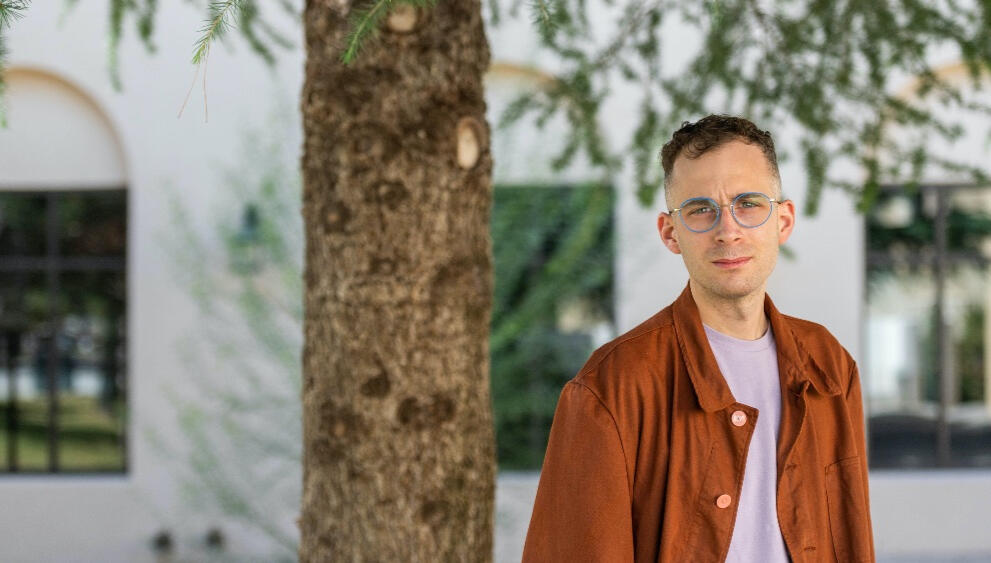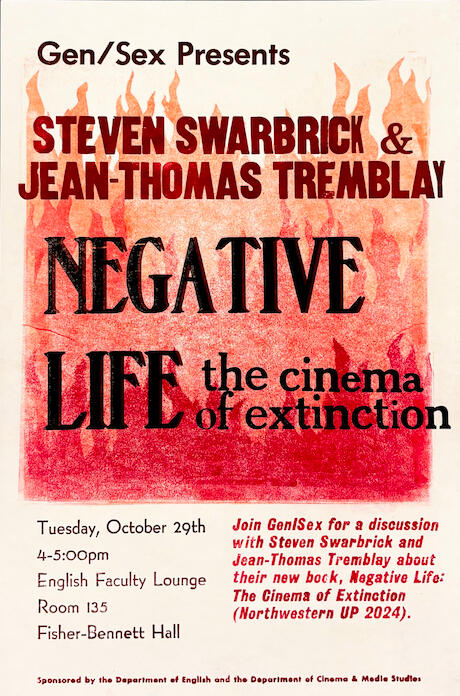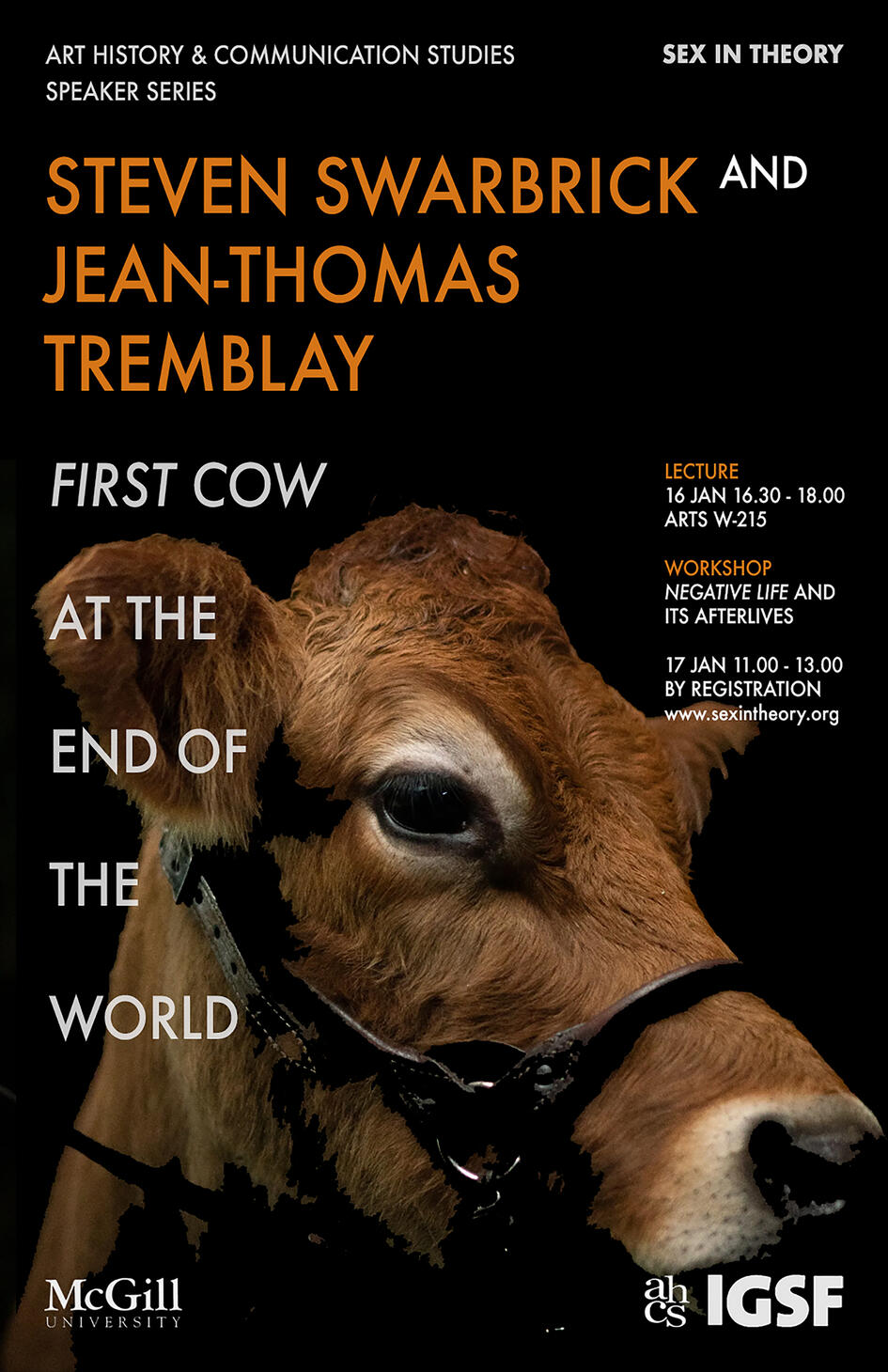Jean-Thomas Tremblay
Scholar of literature, film, ecology, and sexuality

Jean-Thomas Tremblay is an Associate Professor of English and the Director of the Graduate Program in Social & Political Thought at York University, in Toronto. He holds graduate appointments in English, Social & Political Thought, Science & Technology Studies, and Humanities.Spanning literary studies, film studies, the environmental humanities, and sexuality studies, Tremblay’s research and teaching bring aesthetic modes of attention to conceptual and historical problems pertaining to overlapping environmental, economic, and political crises in settler and extractive societies. One question animating his inquiry, on display in his first monograph, Breathing Aesthetics (Duke University Press, 2022), has to do with how to account for the interplay between subjects and their milieux without dissolving embodiment and experience into the world’s undifferentiated multiplicity. Breathing Aesthetics diagnoses a “crisis in breathing” marked by the air’s exacerbated pollution (from endemic allergies to photochemical smog), weaponization (the adoption by militarized police of chemical devices banned in warfare), and monetization (the enclosure of breathing space and the growth of the “breathfulness industry”) since the 1970s. Tremblay contends that breathing has emerged as a medium that renders embodiment and experience as effects of biopolitical and necropolitical forces—forces that optimize certain lives and trivialize or attack others. Chapters covering literary, screen, and performance cultures find in respiratory works historically and culturally situated tactics and strategies for navigating precarious and injurious environments. In 2023–2024, the book was cited as the main inspiration for a major Contemporary Calgary exhibition gathering artists with disabilities.In Breathing Aesthetics and, more vigorously and extensively, in his recent and current research, Tremblay also asks how the environmental humanities configure social and political life, and what role the field expects aesthetic objects, especially the narrative arts, to play in this life. Negative Life: The Cinema of Extinction, (“Superimpositions: Philosophy and the Moving Image” series, Northwestern University Press, 2024), a monograph coauthored with Steven Swarbrick, quarrels with an ethics of relation that ecocriticsm often expresses as a faith in “entanglement” or “enmeshment.” The titular concept, negative life, names the formalization and materialization by film of life’s heightened contradictions amid the sixth mass species extinction. Encounters with negative life are precipitated by specimens of disaster, eco-horror, and transcendental cinema whose deflagrated pastorals prohibit characters and spectators from accessing a horizon of harmonious coliving. These films locate in encounters with the natural world not the plenitude of interspecies wisdom but a gap in signification or, in the book’s psychoanalytic idiom, an “apedagogical drive.”To read literature or film against ecocriticism’s customary pedagogical schemes is not to free oneself, nihilistically, from the pressures of learning anything; it is instead to take seriously the duty of learning what one does not already know. In an ongoing solo project fund-ed by the Social Sciences and Humanities Research Council of Canada that will culminate in a monograph tentatively titled “The Climate after the Fact,” Tremblay contends with the reduction of “stories” to the task of “raising awareness” or “conscious-ness” by both present-day environmentalism and the environmental humanities. The eco-citizen produced by such an aesthetic education achieves legibility within a liberal-humanist framework whose operation as a regime of violence and exclusion has been crucially exposed by Black and feminist critics of sentimentality. “The Climate after the Fact” carries two aims, both of which rely on a betrayal of content by form in the cases Tremblay assembles. The first is to untether “climate action” from a late-liberal edict of sense- or meaning-making. The second is to synthesize a critical genealogy that—from post-Kantian thought to deconstruction, to Afropessimism—resists an imperative to endorse the “given world” and its expansionist, colonial and imperial status quo. In “Just Sabotage,” an excerpt from this project published in Critical Inquiry, Tremblay argues that Nell Zink’s and Benedikt Erlingsson’s absurdist comedies on the page and the screen align political efficacy with epistemic collapse. Another excerpt, this one printed in Representations, turns to melodramas of toxic contamination, including those of Henrik Ibsen and Todd Haynes, to come to terms with the (logical rather than probabilistic) impossibility of managing aquatic contamination through capitalist and legal means of regulation and redress.Tremblay is a member of the Advisory Board of differences: A Journal of Feminist Cultural Studies and a Contributing Editor to Discourse: Journal for Theoretical Studies in Media and Culture.A hyperlinked selection of Tremblay’s publications is available below.PUBLICATIONSMonographsNegative Life: The Cinema of Extinction, coauthored with Steven Swarbrick, Northwestern University Press (2024)
Superimpositions: Philosophy and the Moving Image series, edited by Brian Price
Honourable Mention, 2025 Association for the Study of the Arts of the Present Book Prize
Finalist, 2025 Ecocritical Book Award of the Association for the Study of Literature and the Environment
Reviewed in Film Quarterly, Cultural GeographiesBreathing Aesthetics, Duke University Press (2022)
Reviewed in ISLE: Interdisciplinary Studies in Literature and the Environment, Visual Studies, ASAP/Journal, Los Angeles Review of Books, Lateral: Journal of the Cultural Studies Association, E3W Review of Books
Cited by curator Amanda Cachia as the inspiration behind the exhibition Resistance and Respiration, presented at Contemporary Calgary from November 30, 2023, to April 14, 2024Edited book and journal issueAvant-Gardes in Crisis: Art and Politics in the Long 1970s, coedited with Andrew Strombeck, State University of New York Press (2021)Breath: Image and Sound, special issue of New Review of Film and Television Studies 16, no 2 (2018)Articles in refereed journals“Enemies of the People,” Representations 169 (2025), 104–29.
Special issue: Elementality, edited by Mario Telò and James I. Porter.“Just Sabotage,” Critical Inquiry 51, no. 1 (2024): 90–113“Sex in Nature: Darwin, Dedramatized,” coauthored with Jules Gill-Peterson, Regeneration: Environment, Art, Culture 1, no. 1 (2024)
Special issue: Nature Fights Back, edited by E. L. McCallum and Cameron Clark“Homeostasis and Extinction: Ted Chiang’s ‘Exhalation,’” SubStance: A Review of Theory and Literary Criticism 52, no. 1 (2023): 22–29
Special issue: Breathe, edited by David F. Bell, Pierre Cassou-Noguès, Paul A. Harris, and Éric Méchoulan“Black Ecologies (Humanity, Animality, Property),” GLQ: A Journal of Lesbian and Gay Studies 29, no. 1 (2023): 129–139“Diagnostic Spectatorship: Modern Physical Culture and White Masculinity,” Modernism/modernity Print Plus 6, no. 2 (2021)
Special issue: Modernism and Diagnosis, edited by Lisa Mendelman and Heather A. Love“Destructive Environmentalism: The Queer Impossibility of First Reformed,” coauthored with Steven Swarbrick, Discourse: Journal for Theoretical Studies in Media and Culture 43, no. 1 (2021): 3–30“Feminist Breathing,” differences: A Journal of Feminist Cultural Studies 30, no. 3 (2019): 92–117
Special issue: –30–: The End of the Story, edited by Elizabeth Weed and Ellen Rooney“Aesthetic Self-Medication: Bob Flanagan and Sheree Rose’s Structures of Breathing,” Women & Performance: a journal of feminist theory 28, no. 3 (2018): 221–238“Breath: Image and Sound, an Introduction,” New Review of Film and Television Studies 16, no. 2 (2018): 93–97“An Aesthetics and Ethics of Emergence, or Thinking with Luce Irigaray’s Interval of Difference,” Criticism: A Quarterly for Literature and the Arts 59, no. 2 (2017): 279–299“Room for Critique: The Spaces of Institutional Disillusionment of 1970s U.S. Feminist Fiction,” Post45 Peer-Reviewed (2016)Chapters in books“Skunk: Olfactory Violence and Morbid Speculation,” coauthored with Hsuan L. Hsu and Aleesa Cohene, Law and the Senses: Smell, edited by Caterine Nirta, Danilo Mandic, Andrea Pavoni, and Andreas Philippopoulos-Mihalopoulos, University of Westminster Press (2023)“Afterword: On Theresa Hak Kyung Cha’s Untitled,” Avant-Gardes in Crisis: Art and Politics in the Long 1970s, State University of New York Press (2021): 233–240“Introduction: Avant-Gardes in Crisis,” coauthored with Andrew Strombeck, Avant-Gardes in Crisis: Art and Politics in the Long 1970s, State University of New York Press (2021): 1–22Reviews in refereed journals"Black Thought’s Mise en Abyme," New Formations, no, 112 (2024): 172–174“Dying Ecofeminism,” TSQ: Transgender Studies Quarterly 10, no. 2 (2023), 189–194“Julie Beth Napolin, The Fact of Resonance,” Modernism/modernity 28, no. 2 (2021): 290–292Review essay on the de-idealization of gender and sexuality as objects of inquiry in recent queer and trans studies scholarship, American Literature 92, no. 4 (2020): 817–820“Elizabeth A. Povinelli, Geontologies,” Critical Inquiry 45, no. 3 (2019): 232–234Public scholarship“Being Here, Leftover,” Post45 Contemporaries (2025)
Cluster: After the Leftovers, edited by Erica Fretwell and Anna Krauthamer"Ecocriticism against The Wall," differences: A Journal of Feminist Cultural Studies (2024)"Basically the Same: Todd Haynes's May December," differences: A Journal of Feminist Cultural Studies (2023)“The Haynes Code,” Los Angeles Review of Books (2022)Contribution to the forum “On Lauren Berlant,” n+1 (2021)“Together, in the First Person,” Chicago Review (2020)“On Queer Ecopoetics and the Natures We Cannot Disavow,” Dispatches from the Poetry Wars (2020)
Reprinted in Poetics for the More-than-Human World: An Anthology of Poetry and Commentary, edited by Mary Newell, Bernard Quetchenbach, and Sarah Nolan, Spuyten Duyvil (2020): 480–482As coeditor, with Rebekah Sheldon, essay cluster on Jules Gill-Peterson’s Histories of the Transgender Child, The Rambling (2019)“Poetics of Gender Self-Determination,” The Rambling (2019)“Franco ‘Bifo’ Berardi, Breathing: Chaos and Poetry,” Full Stop (2019)“The Aesthetic is Back; It Never Left,” Los Angeles Review of Books (2018)“No More Nature: On Ecopoetics in the Anthropocene,” Los Angeles Review of Books (2018)“Renee Gladman, Houses of Ravicka and Prose Architectures,” Chicago Review (2018): 193–196“Stories of New Narrative,” Los Angeles Review of Books (2017)

Poster design by Austin Svedjan
INTERVIEWS AROUND NEGATIVE LIFE: THE CINEMA OF EXTINCTIONASLE EcoCast, with Lindsay Jolivette and Alex Tischer (November 29, 2024)
LinkNew Books in Film, New Books Network, with Jules O'Dwyer (November 23, 2024)
LinkHigh Theory, with Kim Adams (January 8, 2025)
LinkFTQ Podcast, with Che Gossett (March 14, 2025)
Link
EVENTS AROUND NEGATIVE LIFE: THE CINEMA OF EXTINCTIONAutumn 2024October 11, 5 pm – 7 pm
Cinema Studies Institute, University of Toronto
Conversation around Negative Life with Brian Price, editor of the Superimpositions series
Link
RecordingOctober 18, 1 pm – 2:30 pm
ASAP Conference, New York City
“Negativity is Not a Luxury” panel around Negative Life with Elizabeth Wilson, Rahul Sen, and Kartik Nair
LinkOctober 29, 4 pm – 5 pm,
Gen/Sex Working Group, University of Pennsylvania
"The Queer Impossibility of First Reformed" talk and conversation around Negative Life
LinkOctober 30, 12:30 pm – 2 pm
Colloquium in Visual Culture, Bryn Mawr College
“First Cow at the End of the World” talk
LinkNovember 15, 3 pm – 5 pm
Department of Rhetoric and Center for Interdisciplinary Critical Inquiry, UC Berkeley
“The Cinema of Negative Ecology” symposium with Rizvana Bradley, Iggy Cortez, Patrice Douglass, Debarati Sanyal, Mario Telò, and Damon Young
LinkWinter 2025January 16, 4:30 pm – 6 pm / January 17, 11 am – 1 pm
Art History & Communications Speaker Series, Sex in Theory Working Group
McGill University
"First Cow at the End of the World" talk and "Negative Life and Its Afterlives" workshop
LinkFebruary 26–28
Cinema and Extinction Conference
University of Indiana at Bloomington
Keynote lecture and film screening
Link

Poster design by Bobby Benedicto